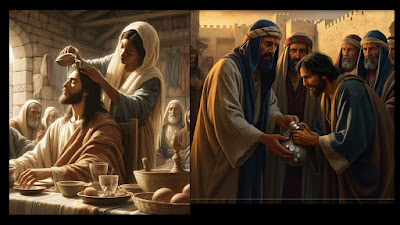“Be Ready: The Parable of the Ten Virgins”
The parable of the ten virgins is a deeply meaningful story, especially for those who look forward to Christ’s return. It teaches about watchfulness, preparation, and the personal nature of our relationship with Jesus. Jesus said, “Then the kingdom of heaven will be like ten virgins who took their lamps and went to meet the bridegroom” (Matthew 25:1). But what lessons does this parable offer for the last days and for our walk with Christ—both personally and as His church?
The Parable and the Last-Day Context
The context of Matthew 25 is the Olivet Discourse—Jesus’ final teachings before His crucifixion, where He speaks at length about the end of the world (see Matthew 24). The ten virgins represent those who profess to be waiting for the return of Christ, but only half are truly prepared.
This directly parallels the last-day church. Jesus warns that not everyone who appears to belong to Him will enter the kingdom: “Not everyone who says to me, ‘Lord, Lord,’ will enter the kingdom of heaven” (Matthew 7:21). The parable serves as a solemn call to readiness, especially in a time when spiritual complacency can feel comfortable.
The Significance of the Delay
“The bridegroom was a long time in coming, and they all became drowsy and fell asleep” (Matthew 25:5).
The delay of the bridegroom represents the apparent delay of Christ’s return. Many have wondered for centuries, “Where is this coming He promised?” (2 Peter 3:4). Yet Peter reminds us that God's timing is not ours: “The Lord is not slow in keeping his promise... but is patient with you, not wanting anyone to perish” (2 Peter 3:9).
The delay tests our faith. Do we serve God only when the end seems near? Or are we faithful even when the wait grows long?
Individual Relationship vs. Corporate Identity
All ten virgins belonged to the same group. Outwardly, they all looked the same—lamps in hand, waiting for the groom. But only five had oil. The oil represents the Holy Spirit (Zechariah 4:6), and it must be received personally.
This teaches a vital truth: we cannot rely solely on the corporate identity of the church for salvation. The wise virgins could not share their oil because the Holy Spirit cannot be borrowed. Just as salvation is personal, so is preparation.
Romans 8:9 says, “If anyone does not have the Spirit of Christ, they do not belong to Christ.” Being part of the visible church is not enough; we must each know Christ personally and be filled with His Spirit.
“The Door Was Shut” – A Call to Readiness
When the bridegroom arrived, those who were ready went in with Him to the wedding feast, and “the door was shut” (Matthew 25:10). When the foolish virgins returned, it was too late.
This is one of the most sobering images in Scripture. It reminds us that there will be a point when it is too late to prepare. “Watch therefore, for you know neither the day nor the hour in which the Son of Man is coming” (Matthew 25:13).
Warning Call to Us
The parable of the ten virgins is not just a beautiful story—it’s a warning and a call. The delay of the bridegroom reminds us that we must be faithful through the waiting. The distinction between the wise and foolish virgins urges each of us to examine our hearts. Are we truly prepared? Is our relationship with Christ genuine and Spirit-filled?
May we be among the wise—watching, waiting, and ready when the Bridegroom comes. Amen.
More: Sabbath School Lesson 3: Images From Marriage
















